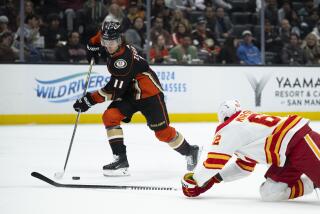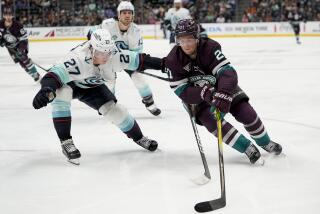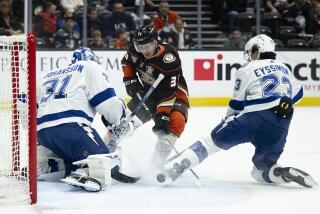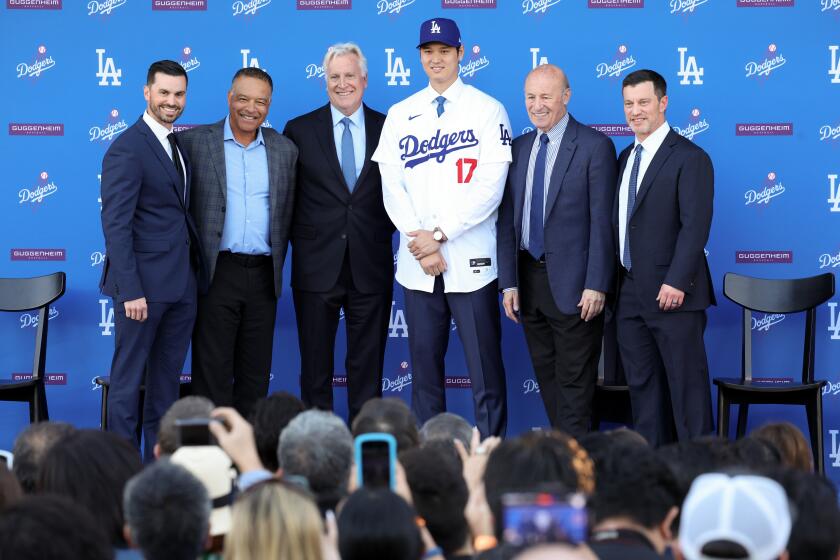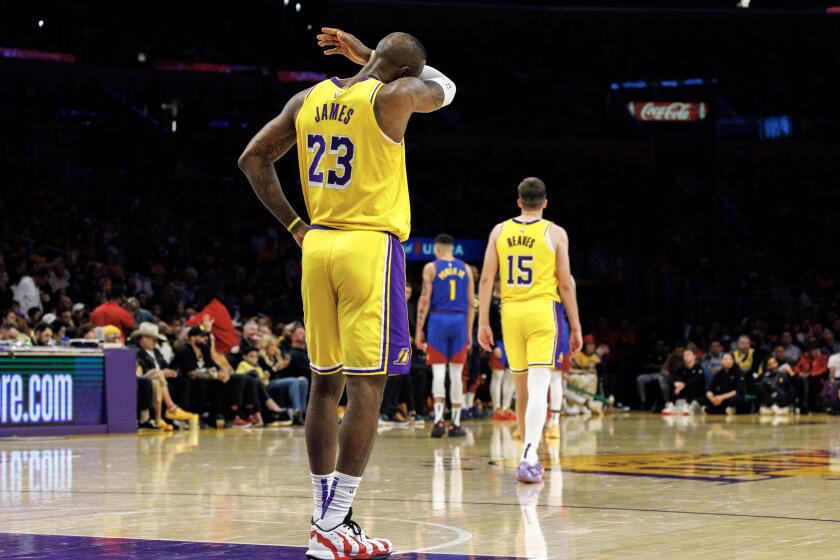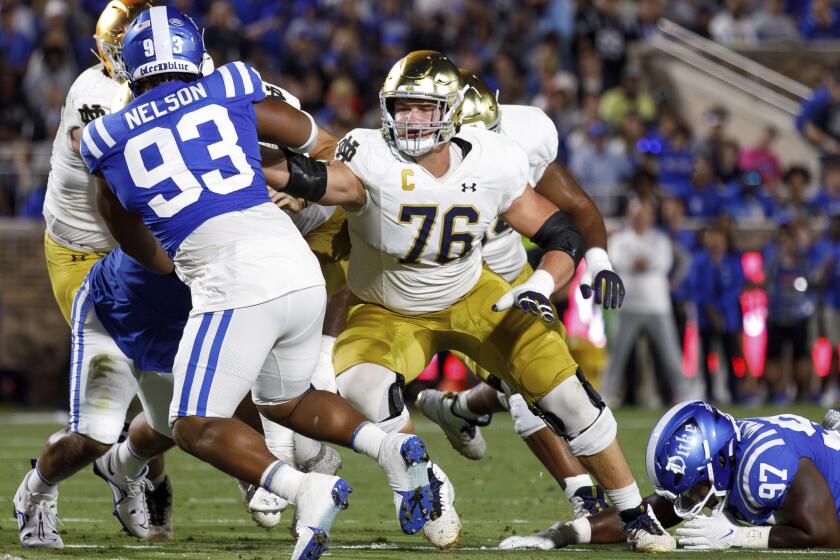Teemu Selanne is central to Ducks history — and can add to it

Were those tears or drops of sweat rolling down Teemu Selanne’s face Sunday as he skated around the Honda Center, absorbing and returning the crowd’s love after the final regular-season game of his Hall of Fame career?
If he wept, he wasn’t alone. Selanne’s love for Southern California was mutual from the day he joined the Ducks in February 1996, traded here by the financially strapped Winnipeg Jets. One sunny breakfast under palm trees, and he was home. “This is my kind of place,” he recalled thinking.
He made it his own, and not just with the dazzling speed that earned him the nickname “Finnish Flash,” and the quick shot that helped him rank 11th in NHL career goals, with 684, and 15th in points, with 1,457. His prime seasons, with linemate Paul Kariya, exemplified the ultimate that hockey can offer. They did drills together in practice before their teammates, talked after each shift about what they could do better, knew each other’s thoughts.
Their bond remains so strong that Kariya, retired and reclusive, attended Sunday’s game. He was the only former teammate Selanne invited.
“I’ve been very lucky that I’ve been playing with unbelievable players, pretty much my whole career. But nothing has been even close to playing with Paul,” Selanne said. “Everything was so easy. We played the same way. We were thinking the same way about the game. It was just like unbelievable.”
Selanne, 43, holds the probably untouchable NHL rookie record of 76 goals in a season, won the first Rocket Richard trophy as the NHL’s goals leader in 1998-99, and got his name on the Stanley Cup with the dominant Ducks in 2007. After two stints with them — he was traded to San Jose in 2001 but returned as a free agent in 2005 following career-saving knee surgery — he is central to their history. He can add to it when the Ducks, seeded No. 1 in the West, face the Dallas Stars in a playoff series that begins Wednesday in Anaheim.
Beyond numbers, Selanne brought to the rink a luminous joy in what he did. And he carried that goodwill to the many hospitals he visited and youngsters he cheered up, the onetime kindergarten teacher always able to connect with kids.
If Selanne did cry Sunday, it’s understandable if his tears mingled with the sweat of exertion after he played a season-high 18 minutes 42 seconds. Though set up often, he didn’t figure in the scoring in the Ducks’ 3-2 overtime victory over Colorado.
If the fates were kinder, he would have scored a dynamic goal or two, but those were rare this season. He had nine goals and 27 points in 64 games, a good deal of his time spent on the fourth line. He averaged 14 minutes 7 seconds’ ice time and only once played both ends of a back-to-back game sequence.
“It’s a tough situation,” Coach Bruce Boudreau said. “I think his presence makes our team better just by him being Teemu. When he’s passionate and everything it gets the team playing better.
“It’s not like I’m sitting here saying, ‘OK, Teemu’s skills have diminished.’ I played until I was 38 but I wasn’t the same player at 38 that I was at 25. Things change a little bit.”
Boudreau told Selanne last summer his role might be reduced, and Selanne weighed that heavily. He has taken it year by year for a while but said this was his toughest decision, one ultimately swayed by the lure of representing Finland at the Sochi Winter Games.
“The Olympics and the whole package was there but my role was still, you know, I wasn’t really, I didn’t know. I still don’t know,” Selanne said last week.
Selanne, whose 255 power-play goals are the third-most in NHL history, was most bothered by not playing on the first power-play unit. But the numbers simply weren’t there on the power play or on rare occasions he played on the top line. He was energetic to start his shifts but couldn’t sustain that in an ever-faster game.
Publicly, he was diplomatic. “It has been sometimes a little tough to sit out,” he said, “but hopefully it’s going to be something which, when we go a long ways, a little bit more extra energy here and there, I think that could be a big advantage for me.”
He lobbied Boudreau for more playing time after his team’s bronze-medal performance at the Sochi Games, where he was voted the tournament’s most valuable player and extended his Olympic scoring record to 43 points in 37 games. Boudreau briefly put him with Ryan Getzlaf and Corey Perry, but it didn’t click.
“I feel about him like everybody else does. I love him,” Boudreau said, but that didn’t stop him from keeping Selanne’s line on the bench when he occasionally went down to three lines.
“My toughest assignment is to make sure he’s getting enough ice and at the same time, he’s in a positive ice,” Boudreau said. “And understanding I’m just a peon as compared to what he is. I know the icon. You look out there and he scores a goal in practice and the guys are all cheering for him. He’s just loved everywhere, and I understand that. There’s tough decisions you have to make for the team, for the benefit of 22 other guys. But you’re still considering the effect of one. I think we’ve done an OK job there.”
No matter what happens in the playoffs, Selanne intends to live in Orange County with his wife and their three sons and daughter, who speak unaccented English. He’s not sure what challenge he will take up next, but he has already succeeded at strengthening hockey in Southern California and will leave the Ducks in better shape than when he arrived.
“It has been a mission here to try to create the reputation for this organization that free agents and guys like to come here to play,” he said. “Before, like when we didn’t have a good team, you have to pay so much more to get somebody to come here. But now I think the reputation around the league is that guys want to come here. It’s a big difference.”
A difference he’s still creating.
Twitter: @helenenothelen
More to Read
Get our high school sports newsletter
Prep Rally is devoted to the SoCal high school sports experience, bringing you scores, stories and a behind-the-scenes look at what makes prep sports so popular.
You may occasionally receive promotional content from the Los Angeles Times.
